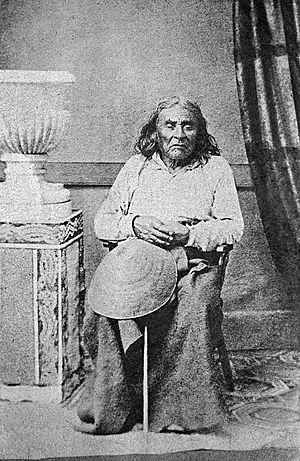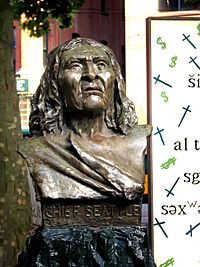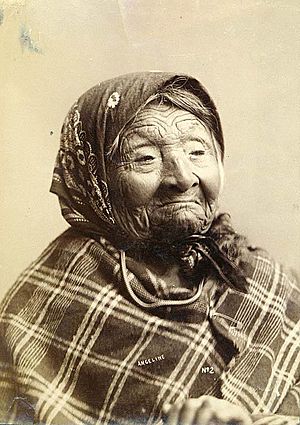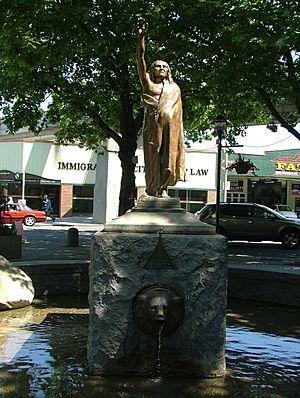Chief Seattle facts for kids
Quick facts for kids
Chief Seattle
|
|
|---|---|
| Si'ahl | |

The only known photograph of Chief Seattle, taken in 1864
|
|
| Suquamish & Duwamish leader | |
| Personal details | |
| Born | c. 1790 Blake Island, Washington, New Spain |
| Died | June 7, 1866 (aged 79–80) Port Madison, Washington, U.S. |
| Resting place | Port Madison, Washington, U.S. |
| Spouses | Ladaila, Owiyahl |
| Relations | Doc Maynard |
| Children | 8, including Princess Angeline |
| Parents | Sholeetsa (mother), Shweabe (father) |
| Known for | namesake of Seattle, Washington, and his speech on the land treaty |
| Nickname | his parents were known to call him “Se-Se” |
Chief Seattle (born around 1786 – died June 7, 1866) was an important leader of the Suquamish and Duwamish tribes. He was known for trying to find peaceful ways for his people to live alongside white settlers. He even became friends with a settler named "Doc" Maynard. The big city of Seattle, in the state of Washington, is named after him. He is also famous for a speech that talks about protecting nature and respecting the land rights of Native Americans.
His name, Seattle, is an English version of his native name, Si'ahl. This name can also be spelled Sealth, Seathl, or See-ahth.
Contents
Life of Chief Seattle

Chief Seattle's mother, Sholeetsa, was from the Duwamish tribe. His father, Shweabe, was a chief of the Suquamish tribe. Seattle was born sometime between 1780 and 1786 on Blake Island in Washington. Some stories say he was born in his mother's village near what is now the city of Kent, Washington. He grew up speaking both the Duwamish and Suquamish languages. Because Native American tribes like the Salish people passed down leadership through both parents' families, Seattle became a chief of the Duwamish tribe through his mother's family.
Seattle became known as a strong leader and a brave warrior when he was young. He led attacks against enemy groups who came up the Green River. In 1847, he helped lead a Suquamish attack on the Chimakum people near Port Townsend. This attack greatly reduced the Chimakum population.
He was a tall and strong man, almost 6 feet tall. Traders from the Hudson's Bay Company called him Le Gros, which means "The Big Guy." He was also a great speaker. People said his voice was so powerful it could be heard from far away when he gave a speech.
Chief Seattle had two wives. His first wife, La-Dalia, had one daughter before she passed away. With his second wife, Olahl, he had three sons and four daughters. His most famous child was his first daughter, Kikisoblu, also known as Princess Angeline. Chief Seattle became a Christian and was baptized into the Catholic Church around 1848.
Around 1850, more and more white settlers started arriving. Seattle worked to keep peace between his people and the newcomers. He met Doc Maynard and they became friends. Maynard helped convince the settlers to name their new town "Seattle" after the chief. This friendship helped create peaceful relations between the tribes and the settlers.
Chief Seattle kept his people out of the Battle of Seattle in 1856. Later, he didn't want his tribe to move to a new reservation because mixing different tribes could cause problems. Maynard helped convince the government to let Seattle and his people move to his father's longhouse at Agate Passage. Chief Seattle often visited the town named after him. He passed away on June 7, 1866, on the Suquamish reservation in Port Madison, Washington.
Chief Seattle's Famous Speech
A speech or "letter" that is said to be from Chief Seattle is very famous. It is known as a strong message asking for respect for Native American rights and for the environment. This document has become very popular, especially with people who care about nature.
However, it's important to know that this document might not be exactly what Chief Seattle said. He did give a speech in 1854 to Isaac Stevens, who was the Governor of Washington Territories. But the speech wasn't written down until almost 25 years later by Dr. Henry Smith. Smith said he wrote it down based on notes he took at the time. The speech was given in Seattle's native Lushotseed language, then translated into another Native American language called Chinook jargon, and then into English. So, it went through several translations, which might have changed some of the original words.

Chief Seattle's Legacy

- Chief Seattle is buried at the Suquamish Tribal Cemetery.
- In 1890, a group of early Seattle settlers put up a monument at his grave. It says, "SEATTLE Chief of the Suqampsh and Allied Tribes, Died June 7, 1866. The Firm Friend of the Whites, and for Him the City of Seattle was Named by Its Founders." On the other side, it says, "Baptismal name, Noah Sealth, Age probably 80 years." The burial site has been cared for and updated over the years.
- The band Soundgarden, from Seattle, used words from Chief Seattle's speech in their cover of the song "Into the Void".
- The Suquamish Tribe celebrates Chief Seattle every year in August during "Chief Seattle Days."
- The Evangelical Lutheran Church in America remembers Chief Seattle on June 7 in its Calendar of Saints.
- The city of Seattle and many other places are named after him.
- A B-17 Flying Fortress airplane, named Chief Seattle, was funded by people in Seattle buying special bonds during World War II. This plane was lost during a mission in 1942.
- The Chief Sealth Trail in southern Seattle is also named after him.
Images for kids
See also
 In Spanish: Jefe Seattle para niños
In Spanish: Jefe Seattle para niños
 | Roy Wilkins |
 | John Lewis |
 | Linda Carol Brown |

